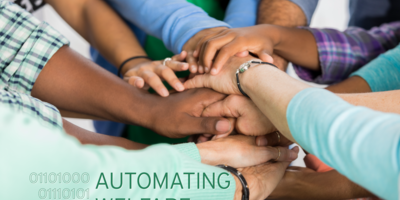Das Projekt AUTO-WELF untersucht den steigenden Einsatz automatisierter Entscheidungsfindung im Wohlfahrtssektor in Europa.


Mag.a Dr.in
Doris Allhutter ist promovierte Politikwissenschafterin mit dem Schwerpunkt Wissenschafts- und Technikforschung. Sie beschäftigt sich mit der Frage, wie soziale Vorstellungen in Informationssysteme eingeschrieben werden, und wie Technikentwicklung und -nutzung gesellschaftliche Verhältnisse mitgestalten. Aktuell untersucht sie Praktiken der Software-Entwicklung im Bereich semantischer Technologien aus einer gesellschaftspolitischen und soziomateriellen Perspektive. Sie ist Mitglied der COST Action zu New Materialism: Networking European Scholarship on 'How Matter Comes to Matter'.
Nach dem Studium der Wirtschaftswissenschaften an der WU Wien absolvierte sie das Postgraduate Programm „Governance in Europe" am Institut für Höhere Studien. Ihr Doktoratsstudium der Politikwissenschaft schloss sie 2007 an der Universität Wien mit einer Arbeit zu digitaler Pornografie und der Internetpolitik der Europäischen Union ab.
Doris Allhutter war von 2003 bis 2007 wissenschaftliche Mitarbeiterin und Lektorin an der Abteilung Gender und Diversitätsmanagement der WU Wien. An der Universität Wien lehrte sie von 2002 bis 2005 am Institut für Politikwissenschaft und am Institut für Publizistik und Kommunikationswissenschaften. Aktuell lehrt Sie im Rahmen des Masters Gender Studies und des Masters Science-Technology-Society an der Universität Wien sowie an der Johannes Kepler Universität Linz. Am ITA arbeitet sie seit 2008 im Bereich Informationsgesellschaft, insbesondere e-Democracy und Politik von Informationstechnologien.
2011 absolvierte sie einen Forschungsaufenthalt am Centre for Science Studies der Lancaster University. 2013 war sie als Austrian Marshall Plan Stipendiatin an der University of California, Berkeley zu Gast. Für ihr aktuelles Projekt "Materiell-diskursive Performativität im Software Design: ein gesellschaftspolitischer Ansatz“ erhielt sie eine vierjährige Senior Postdoc Stelle im Rahmen des Elise Richter Programms des Wissenschaftsfonds (FWF).
Doris Allhutters Publikationen beschäftigen sich mit Methoden und Prozessen der Entwicklung von Informationstechnologien, mit soziotechnischen Konzepten im IT-Design, mit der Herstellung und Verbreitung digitaler Pornografie und ihren politischen Implikationen, sowie mit elektronisch unterstützen Formen der politischen Beteiligung von BürgerInnen.
The interventionist turn in science and technology studies (STS) increasingly involves researchers with practices of technology development and thus entails the need for appropriate methodologies. Based in software engineering, this article introduces the deconstructive technique of “mind scripting” as a method for analyzing processes of the co-materialization of gender and technology and as a tool to support cooperative, reflective work practices. Anchored in critical design approaches, “mind scripting” is a means for development teams to disclose discourses implicitly guiding work practices in order to make negotiable the underlying value systems. After discussing its foundation in deconstructivist feminist theory, the author illustrates how the method is applied by drawing on selected empirical results. Generating insights into the reproduction of hegemonic social discourses in development processes, “mind scripting” enables the rethinking of established ways of doing.
The paper reviews various eco-feedback systems including carbon calculators and discusses how different disciplinary approaches conceptualise and explain anticipated impacts of these systems. The European collaborative research project e2democracy investigates how citizen participation combined with long-term CO2 monitoring and feedback can contribute to achieve local climate targets. Empirical results from local climate initiatives in Austria, Germany and Spain show positive effects in terms of learning about CO2 impacts, increased awareness, enhanced efforts and guidance as well as individual empowerment leading to slightly reduced CO2 emissions. The findings highlight that a combined approach integrating eco-feedback and (e‑)participation is promising to foster sustainability.
This chapter presents a critical approach to software development that implements reflective competences in software engineering teams. It is grounded within qualitative research on software engineering and critical design practice and presents conceptual work in progress. Software development is a socio-technological process of negotiation that requires mediation of different approaches. Research on the co-construction of society and technology and on the social shaping of technological artefacts and processes has highlighted social dimensions such as gender and diversity discourses that implicitly inform development practices. To help design teams implement reflective competences in this area, the authors introduce ‘deconstructive design’ – a critical-design approach that uses deconstruction as a tool to disclose collective processes of meaning construction. For this purpose, the idea of value-sensitive design is linked to approaches of practice-based, situated and context-sensitive learning and to the concepts of ‘trading zones’ and ‘boundary objects’.
Constructive technology assessment aims at anticipating societal impacts of technological innovations and suggests incorporating reflexivity and social learning into technology development. Social learning involves fostering the ability of diverse social actors to cultivate sociotechnical critical skills, thus allowing technological and social change to be governed with consideration for social values and diverging interests. Based on this demand, our paper presents a discourse-theoretical, interventionist approach to software design introducing deconstruction and (un-)learning as reflective practices to guide development processes. Inspired by Donna Haraway’s focus on power relations in technoscience culture, our approach – called ‘deconstructive design’ – traces how structures such as in/formal hierarchies and discursive hegemonies affect the development processes and design decisions of teams or communities of practices. The underlying deconstructivist methodology refers to practice-based concepts of situated learning. Thus, it locates a potential for value-based intervention at the micro/meso-level of everyday work practices.
This paper assesses the status of eParticipation within the political system in Austria. It takes a top-down perspective focusing on the role of public participation and public policies on eParticipation. The status of eParticipation in Austria as well as of social and political trends regarding civic participation and its electronic embedding are analysed. The results show a remarkable recent increase of eParticipation projects and initiatives. A major conclusion is that eParticipation is becoming a subject of public policies in Austria; however, the upswing of supportive initiatives for public participation and eParticipation goes together with ambivalent attitudes among politicians and administration.
Der Beitrag beschäftigt sich mit einem der gewinnbringendsten Zweige der Internetbranche, der Mainstream-Internetpornografie und ihren Rahmenbedingungen im Kontext der Politik der Europäischen Union zu illegalen und schädigenden Internetinhalten. Basierend auf dem Framing-Ansatz wird der Politikprozess zum "Mehrjährigen Aktionsplan zur sichereren Nutzung des Internets" aus grundrechtlicher und feministischer Perspektive untersucht. Dabei wird das Policy Framing der beteiligten EU-AkteurInnen insbesondere hinsichtlich geschlechtersensibler Herangehensweisen und den ihnen zugrunde liegenden theoretischen Zugängen analysiert. Die dominanten Policy Frames der AkteurInnen werden aus unterschiedlichen Schwerpunkten in der Zielsetzung und Definition illegaler und schädigender Internetinhalte und deren grundrechtlichen Implikationen sowie der strategischen Positionierung der AkteurInnen zwischen "möglichen Grundrechtseingriffen" oder der "Betonung liberaler Abwehrrechte" abgeleitet.
This position paper discusses relations between discourse, memories and performativity in design. It suggests making use of the concept of material-discursive performativity to investigate how design and societal hegemonies are co-emergent. In design practice, collective deconstruction of experiences and memories can provide a source for opening spaces of action to trigger (un)learning and the dislocation of established ways-of-doing.
Natur, Wissenschaft, Technik, Gesellschaft und Geschlechterverhältnisse existieren nicht unabhängig voneinander. Sie sind ineinander verschränkt und entstehen in einem kontinuierlichen Prozess miteinander und durcheinander hindurch. Der Lise Meitner Literaturpreis prämiert Erzählungen und Kurzgeschichten, die dieses Verhältnis in besonders hellsichtiger Weise beleuchten. 'Streuungsmuster' ist der dritte Band preisgekrönter und weiterer Texte aus dem Lise Meitner Literaturpreis.
Allhutter, Doris (26.02.2024) Erfüllt AMAS die Ziele des AMS? Profiling von Arbeitssuchenden aus soziotechnischer Sicht und im Blick von Audits. Vortrag bei: Bildungskonferenz 2024 "Künstliche Intelligenz im Prüfkontext" (Rechnungshof), Universität Wien/AUSTRIA.
Allhutter, Doris (18.12.2023) Researching Infrastructures of Welfare: practice-oriented research methods in Auto-Welf. Vortrag bei: Workshop ‘Doing and/in Data’, Vienna (online)/AUSTRIA.
Allhutter, Doris (28.11.2023) How Ideology, Hegemony and Sociomateriality shape the Micro-Politics of Design. Vortrag bei: STS-Austria Conference 2023 ‘Digging Where We Stand: Activism, Community, and the Politics of STS’, ÖAW, Vienna/AUSTRIA.
Allhutter, Doris (28.10.2023) Mind Scripting in Practical Terms. Vortrag bei: Auto-Welf Lunch Time Series, online/AUSTRIA.
Allhutter, Doris (25.10.2023) Infrastructures of Welfare: the datafication of Europe's systems of social protection. Vortrag bei: STS Talk series of the STS Department at the University of Vienna, Vienna/AUSTRIA.
Allhutter, D.; Alushi, A.; Berdys, M.; Hughes, E.; Männiste, M. et al. [..] (26.09.2023) AI in Welfare: public policies, public interest, and political mandate. Vortrag bei: International Workshop: AI Systems for the Public Interest, Berlin/GERMANY.
Allhutter, Doris (14.09.2023) Künstliche Intelligenz in Obersten Rechnungskontrollbehörden. Vortrag bei: Rechnungshof Österreich, Vienna/AUSTRIA.
Allhutter, Doris (06.04.2023) How Ideology, Hegemony and Sociomateriality shape the Micro-Politics of Design. Vortrag bei: Ourselves as Designers Conference (Syracuse University, School of Design), Syracuse/New York (online)/UNITED STATES.
Allhutter, Doris (16.03.2023) Grenzobjekte, Diffractions & Co: Die feministischen Wurzeln der STS und ihre Zirkulierungen. Vortrag bei: Conference: Circulations, Panel: Cyborgs, Aachen/GERMANY.
Allhutter, Doris (23.02.2023) Transforming Welfare Infrastructures in Europe. Vortrag bei: THESEUS Colloquia (Center for Technology, Humanity and Society (THESEUS) at Politecnico di Torino), Turin/ITALY.
Allhutter, Doris (10.02.2023) Automating Welfare in Europe. Vortrag bei: Complexity Science Hub Vienna, Vienna/AUSTRIA.
Allhutter, Doris (26.01.2023) Infrastructures of Welfare: concept and methodological considerations. Vortrag bei: Auto-Welf Lunch Time Series, online/AUSTRIA.
Allhutter, Doris; Kaun, Anne; Lomborg, Stine; Pentzold, Christian; Sztandar-Sztanderska, Karolina (29.11.2022) Automating Welfare – Algorithmic Infrastructures for Human Flourishing in Europe. Vortrag bei: Welfare after Digitalization: Digitalizing Welfare, Outsourcing Responsibility (IT University of Copenhagen (ITU)), Copenhagen/DENMARK.
Allhutter, Doris (10.11.2022) Kumulative Benachteiligung im Arbeitsmarktchancen-Assistenz-System (AMAS). Vortrag bei: Invited Talk at the Colloquium "Data Analytics and Machine Leanring" (Institut für Arbeitsmarkt- und Berufsforschung der Bundesagentur für Arbeit (IAB)), Nürnberg/GERMANY.
Allhutter, Doris (03.11.2022) How Meaning and Colonial Labor Relations are made Infrastructural - building a semantic foundation for machine learning. Vortrag bei: Decolonizing the Internet (AoIR), Dublin/IRELAND.
Allhutter, Doris; Kaun, Anne; Lomborg, Stine; Pentzold, Christian; Sztandar-Sztanderska, Karolina (23.09.2022) Automating Welfare – Algorithmic Infrastructures for Human Flourishing in Europe. Vortrag bei: Norface Governance Midterm Conference 2022, Wien/AUSTRIA.
Allhutter, Doris (26.07.2022) Digital Future(s) of Welfare and the Power of Public Infrastructure. Vortrag bei: 5th European Technology Assessment Conference (ETAC2022) (ITAS - KIT), Karlsruhe/GERMANY.
Allhutter, Doris (06.07.2022) Reconfiguring ‘unemployment’ through automated decision-making in employment services. Vortrag bei: Politics of Technoscientific Futures (EASST), Madrid/SPAIN.
Allhutter, Doris (18.02.2022) Diskriminierungsrisiken von Frauen im Arbeitsmarktchancen-Assistenzsystem (AMAS). Vortrag bei: Auswirkungen von algorithmischen Systemen auf die Arbeitsmarkchancen von Frauen (Senatsverwaltung Berlin), Berlin/GERMANY.
Allhutter, Doris (18.02.2022) Social Inequality in Austria’s Employment Prospects Assistance System. Vortrag bei: Roundtable „Next Generation AI“ – Social Aspects of AI (Ludwig-Maximilians-Universität), München/GERMANY.
Natur, Wissenschaft, Technik, Gesellschaft und Geschlechterverhältnisse existieren nicht unabhängig voneinander. Sie sind ineinander verschränkt und entstehen in einem kontinuierlichen Prozess miteinander und durcheinander hindurch. Der Lise Meitner Literaturpreis prämiert Erzählungen und Kurzgeschichten, die dieses Verhältnis in besonders hellsichtiger Weise beleuchten. 'Streuungsmuster' ist der dritte Band preisgekrönter und weiterer Texte aus dem Lise Meitner Literaturpreis.
Tel.: +43 1 515 81-6585
Fax: +43 1 515 81-6570
Bäckerstraße 13, 1010 Wien
dallhutt(at)oeaw.ac.at